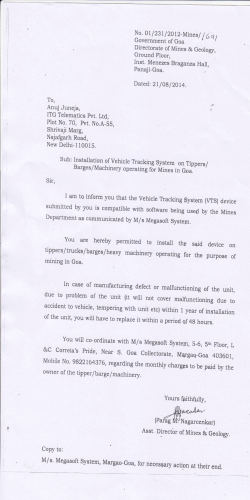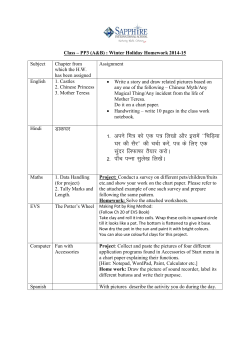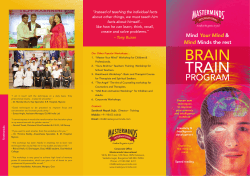
`I am pleased that I could do my language proud`:Mauzo
Tuesday, May 5, 2015 Several real-life heroes have gained from lending their stories to the big screen, but the royalty payment has not necessarily been commensurate with their contributions P4 VIVA GOA celebrates its 5th anniversary P3 Local Flavour Triumphs By Jugneeta Sudan “When you want something the whole universe will conspire together to help you get it”, said Paulo Coelho. D amodar Mauzo joins the league of great writers like Rabindranath Tagore (who was unknown outside his home till he was translated), Ananthamurthy, Orhan Pamuk, Haruki Murakami ..........in making local flavour a universal song of humanness. His book of short stories, Teresa’s Man and Other Stories from Goa, has been long listed for the prestigious international Frank O’Connor’s Short Story Award. ‘Translation’ (a target of dialectics at literary festivals) has yet again served the purpose of taking regional writings (Konkani in this case) to a wide readership on a global platform. Goa’s most-loved man of letters, true to his repute, has brought together a gamut of Konkani and English writers and readers under one platform - a feat in itself. Great credit goes to Xavier Cota the translator, instrumental in this phenomenal story of triumph. Teresa’s Man and Other Stories from Goa is a potpourri of realism, poetic myth, sadness, perception and gaiety. Bhai’s art is kind but unsentimental, mocking but uncynical, profoundly Goan but distinctively individual. An innate sense of irony coupled with a complete absence of pomposity and pretence is what makes Bhai a wonderful writer. He creates thoughtful fiction centred on serious moral concerns rooted in the Goan experience, but a universal human dimension makes it encompass the entire human condition (reminiscent of Malgudi Days by R K Narayan). A dichotomy of human emotion underlies the pieces Happy Birthday and Coinstav’s Cattle. The former is an ironical portrayal of a range of emotions between parents and children. A feeling of pure unconditional love is hence mixed with shame, lack, self-consciousness and defeat; a dark and true element of human shallowness in relationships. Bhai understands that the highest satisfaction may come from the reader’s growing recognition and understanding of the characters and their situations. The presentation of human beings or of human ‘I am pleased that I could do my language proud’: Mauzo The eleventh edition of the Frank O’Connor International Short Story Award Longlist has Goan author Damodar Mauzo’s work ‘Teresa’s Man and Other Stories from Goa’ in its selection. The award, named after short story writer Frank O’ Connor, is also currently the world’s richest prize for short fiction. Damodar Mauzo expressing his sentiments on being long-listed for the prestigious prize shares with NT BUZZ memories associated with the stories I t is indeed an honour to be nominated for this prestigious award. I feel overwhelmed by the very fact that, in this longlist that is declared, I am in the company of the best of short fiction writers from the world over. The nomination is the result of months-long deliberations of the jury that consists of select few critics known for their integrity. Though the nomination has come my way as a surprise, I was never in doubt about the meritorious content of the book. The credit for taking the stories aptly into English goes to my translator friend Xavier Cota. Myself a short fiction writer, I am very happy that the award given in the name of the renowned Irish writer inspires short fiction writers across the world. I will be happy to see more bhasha writers being nominated for such big awards. I am delighted to note that this is the first time that a book of stories originally written in Konkani is being nominated for the most prestigious Frank O’Connor International award. By the way, Teresa’s Man is the only book among the four Indian nominations that is originally a regional language work. The rest all are written originally in English. Now that Konkani literature is being taken cognizance of in the International arena, I am pleased that I could do my language proud. MEMORIES… The story was written in the late sixties. There was a man who would regularly cycle to my shop just in time to pick his wife who travelled by the local train from Vasco. He would buy a cigarette and then chat with me until the train arrived. The wife was a working woman while he was a good for nothing, I found. On Sundays they would both come and collect their provisions. He then would beg for a pack of cigarettes and she would curse him though invariably oblige. One day this henpecked husband suddenly became furious for some minor reason. I felt this weakling’s manliness suddenly trying to prove a point. That is all that inspired me to write this story. The ambience of a village like Majorda has been depicted in the story. The characters are real life ones whom we see even today. I have only tried to weave the complex man-woman relationship that works at various levels. Teresa’s Man had the fortune of appearing in three different translations - the first one by Augusto Pinto, the next by Sachin Pai Raikar and the recent by Xavier Cota. The story was taught at the college level. It also was picked up by Katha for its inclusion in the compilation called ‘Imaging the Other’ wherein stories written by men on women and those written by women on men were anthologised. It has also gone into several Indian languages. situations and the revelation of truth inherent in that human situation leads to a gradual and slow illumination of facts which is more satisfying than a manipulated perfectly worked out plot. His stories in the book like The Cynic, She’s Dead, From the Mouth of Babes and Sand Castles largely embody this aesthetics. So important is a character to fiction that one may approach the story by asking “Whose story is this?” Bhai’s domain of fiction is the world of credible human beings, amazingly diverse and varied. Bhai essentially tends to reveal his characters indirectly through thought, dialogue and action folded into the drama itself. He very convincingly makes his characters speak ‘in character’. Bhai’s lifelikeness in his writings is credible and original. He uses symbols and imagery to add atmospheric verisimilitude to situations. “It is high noon. The sun, like a ruthless foe, is literally branding her body. Below, the baked earth and above, the unrelenting orb of fire. The whole earth is engulfed in heat like a pie being baked in the oven.” “The idol, the Chovoth, the basket of sweets, firecrackers- all started fleeing away one by one!” There are stories here in the book which may be termed as comedies of manner. Bhai shows us what the characters are doing in such a way that we can understand why they are doing it. Out of the details of what they do and say, Bhai builds up the conflict and tensions. Shanker in Vighnaharta finds an escape in a ritual thus bringing the comedy of manners to an ironical denouement. The literary constructions have brevity and tautness, which lend unity and power to the writing. Dattaram, a bullet bike driver, gives vent to his feelings of anger and frustration. Three powerful lines at the end of the story encompass the whole experience dramatically - “Dattaram’s eyes were bulging, he was speechless. Getting back on the bike, he started it. Finally finding his voice, he spat out: ‘This is our language! This is our culture!’” A short story is, after all, not a transcription of life but a dramatisation of it. In the familiar and the real, a skilful writer weaves vivid and dramatic threads to transform the banal, clichéd and formulaic reality into a potent story. Teresa’s Man then becomes a meaningful read, a ride through the unknown, yet known realms of human lives. Book born from the heartbelt of Konkani culture rides the wave to star power. Kudos! Pic by VIpul Rege | NT BUZZ
© Copyright 2026









